The Best Part of 'Sex Education' Is Its Black Characters
- Oops!Something went wrong.Please try again later.
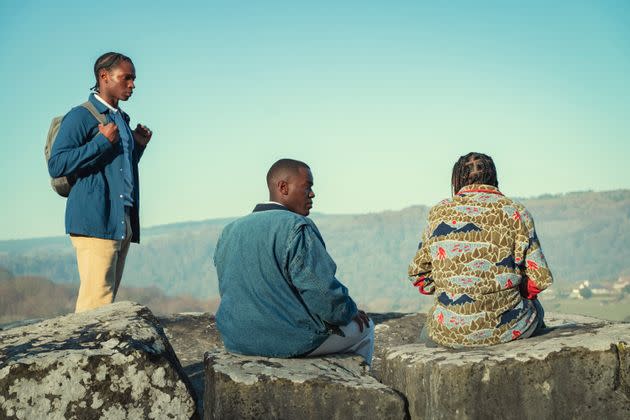
Kedar Williams-Stirling as Jackson (left), Ncuti Gatwa as Eric and Dua Saleh as Cal in Netflix's fourth and final season of "Sex Education."
Season 4 of the hit British dramedy “Sex Education” landed Thursday on Netflix, signaling the end of our journey with the beloved students at Moordale Secondary. The coming-of-age series follows teen sex therapist Otis Milburn (Asa Butterfield) and a group of adolescents as they navigate life, love and, notably, their personal relationships with sexual and emotional health, identity and other big issues.
In the show’s final season, Moordale Secondary has shut down and students are transferred to the uber-progressive campus of Cavendish College. Though Season 4 boasts an array of guest stars, including Dan Levy and Jodie Turner-Smith, along with some excellent additions to the cast, the show’s Black characters continue to propel “Sex Education” in the best way. When the systems around these Black students fail them, they lean on, console and rescue each other time and time again.
Audiences rarely see principal Black characters written with such depth on TV series. Yet “Sex Education” masterfully portrays their livelihoods, identities and individual personalities without associating Black adolescence as strictly synonymous with trauma. In joy, comedy and grief, Eric Effiong (Ncuti Gatwa), Jackson Marchetti (Kedar Williams-Stirling), Vivienne Odusanya (Chinenye Ezeudu) and Cal Bowman (Dua Saleh) are all prisms through which the ever-expansive, nuanced lived experiences of Black youth are told.
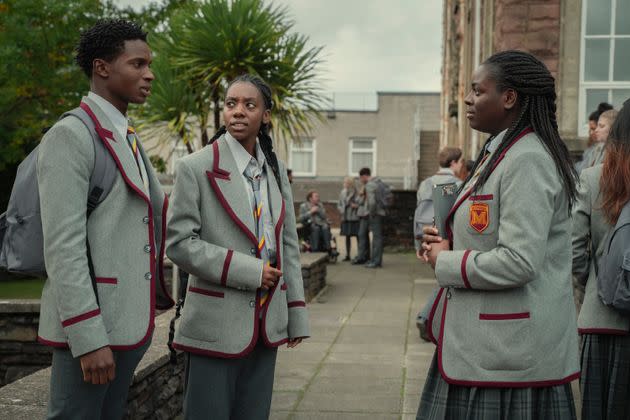
In Season 3 of "Sex Education," Jackson (left) develops a crush on Cal (center), which Vivienne (right) takes note of as she tutors him.
Though we see each of the characters meander through identity-based struggles, it’s not without purpose or for the sake of shock value. Be it wrestling with sexuality, gender identity or what it means to be a young Black man battling anxiety, these experiences actually steer the growth of these characters and speak to the everyday experiences of young Black viewers.
I see my younger self in Vivienne, a headstrong, intelligent and determined Black academic who wants to succeed by any means necessary. But sooner rather than later, she realizes the importance of divorcing her personhood from external success — and adamantly refuses to become an institutional pawn at the expense of her personal relationships and values. She develops a friendship with star athlete and former head student Jackson, and we get to see bits of her steamy long-distance relationship with her first boyfriend, Eugene (Reece Richards).
While I take issue with Vivienne’s romantic storyline in Season 4, as I’d much rather prefer to see a darker-skinned, young Black woman sought after in a healthy way, I understand the purpose that narrative serves. Adolescence is shaped by learning, through hurt and triumph, but also by finding community along the way. Not only does she learn the signs of domestic abuse, but also, once again, her best, platonic male friend, Jackson, remains by her side even when she refuses to accept the truth.
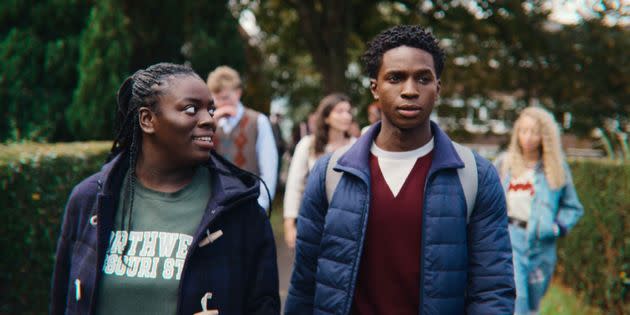
Chinenye Ezeudu (left) plays Vivienne Odusanya, an uptight, brilliant academic who builds a friendship with star athlete Jackson Marchetti.
Viv and Jackson become friends in Season 3, as she tutors him when Jackson’s grades slip. The decline in performance is due to his generalized anxiety disorder but also his angst as he embarks on his journey to self-discovery, which many teens can relate to. This season, Jackson is determined to find his sperm donor, as he was raised by two lesbians. Now Vivienne doesn’t endorse his decisions to circumvent his mothers’ wishes, but, nonetheless, she stands by him amid his grief and confusion. When a testicular cancer scare arises, Vivienne quells his fears and grows closer to him, despite her overbearing, controlling partner.
In Season 3, Jackson seeks to develop a romantic relationship with Cal, a nonbinary student from Minnesota who’s at odds with the head teacher over stringent, rigid and gendered dress codes. During intimate moments, Jackson still fondles Cal as though they were a woman. He has to pause and ask himself whether he’s queer or even capable of navigating a queer relationship without burdening his partner, who’d have to explain Queer Sex 101 to him. (As we saw with Eric and Adam, played by Connor Swindells, in previous seasons, said dynamic does not typically lend itself to success.)
Understandably, Jackson needs time and space from Cal to sort out his needs, unpack his feelings and heal from his first true heartbreak. This season, we see Cal find a new love interest with a queer, deaf Black femme in an ethically non-monogamous relationship.
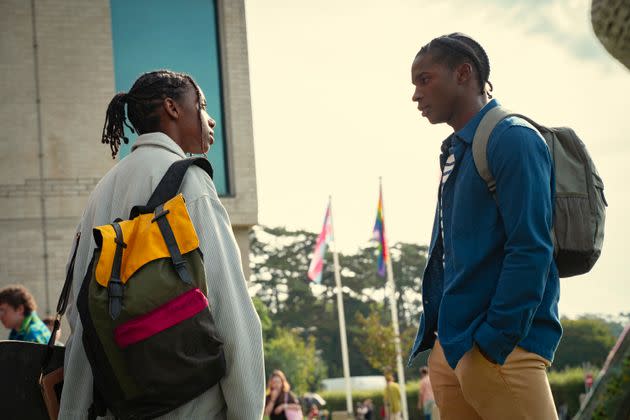
When Jackson realizes that he may not be ready for a queer relationship, the two amicably part ways and he creates distance from Cal.
But as gender dysphoria rears its head and the expensive realities of gender-affirming care set in, we see Cal become a recluse. They become a shell of themselves, and eventually Cal’s mother reports them as missing. As a wave of anti-LGBTQ+ and anti-trans legislation is passed in the United States, “Sex Education” shows the very real effect when queer children hear messaging that the world does not want them to exist.
That’s when Eric comes in. Known as Otis’ partner in crime, the show’s first out, proud and loud Black gay character has borne the brunt of suffering for being his authentic self. Yet time and time again, he rises above and prevails. Audiences rightfully criticized the trope of his character falling in love with his bully in earlier seasons, but in Season 4, we see Eric find his footing, growing close with an all-queer friend group at Cavendish and developing a newfound fling with a boy from his church.
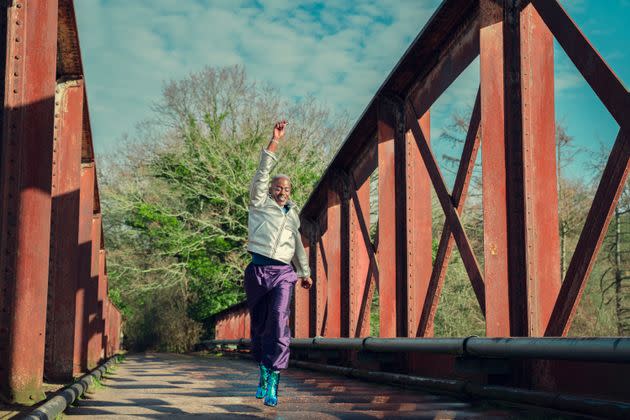
Ncuti Gatwa stars as Eric Effiong in "Sex Education," Otis Milburn's partner-in-crime and Black gay best friend.
Amid the Black queer joy, Eric is tasked with detangling his relationship with queerness and religion. As the child of a devout Nigerian mother, she fervently wants him to get baptized, but Eric is unsure of professing his faith while being forced to conceal his full self to appease the congregation. When baptism day arrives, he takes a stand for himself, proclaiming that his sexuality and his faith are not mutually exclusive. He is gay and still a child of God, an epiphany that leads him to make the decision to become a pastor.
Upon leaving the sanctuary, he has a vision in which he’s led to a mountaintop by God, portrayed by Jodie Turner-Smith, where he finds Cal sitting solemnly. Eric sits with Cal, reminding them as another Black queer person that joy is their birthright and they deserve goodness. An out-of-breath Jackson finds them both sitting alongside the ledge — Jackson had embarked on a countywide search for Cal — and they both continue to console Cal, a scene that will be embedded in my memory.
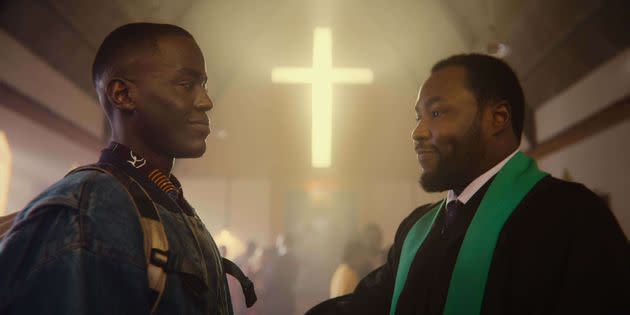
By the end of Season 4, Eric realizes that his calling is to become a pastor, leading an inclusive church.
These characters are the heart and soul of “Sex Education.” They’re written with such care and embody the maturity that Black youth are forced to possess at a young age while preserving their joy and integrity.
What this series has proved is that Black characters deserve more than supporting narratives intended to prop those of the white leads up; they are the vehicles driving the plot. To Eric, Jackson Marchetti, Vivienne and Cal: you will be so missed.
